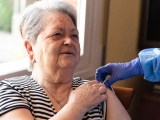Sep 27, 2011 (CIDRAP News) – Vaccinating women during the postpartum period is one strategy used to protect newborns against pertussis, but an optimal antibody response may not occur fast enough to protect babies during the first few weeks of life, Canadian researchers reported yesterday.
With pertussis rates increasing over the past 25 years, the mortality burden has shifted to babies younger than 6 months who are too young to be vaccinated. In 2010, a pertussis outbreak in California sickened at least 9,120 people and led to the deaths of 10 infants.
Public health officials have suggested that "cocooning" immunization strategies, such as vaccinating family members and caregivers, against the disease can help protect vulnerable infants. Other suggested strategies include vaccinating women during pregnancy or immediately afterward to induce antibody through placental transfer or through breast milk.
To assess how quickly pertussis antibodies build in postpartum women who receive the tetanus-diphtheria-acellular pertussis (Tdap) vaccine, researchers from Halifax, Nova Scotia, conducted a two-part study. They published their findings in the Sep 26 early online edition of Clinical Infectious Diseases.
The first part of the study, involving healthy, nonpregnant women ages 18 to 35, was designed to determine the optimal time to measure antibodies in the second part of the study, which assessed if antibodies to pertussis antigens are transferred in breast milk and if maternal antibody response to Tdap vaccine occurs rapidly enough to protect mothers during the postpartum period.
In the first study, researchers enrolled 30 women from Halifax. Researchers obtained blood samples and then administered a single dose of Tdap. Additional serum samples were collected on days 1, 2, 3, 5, 7, 14, and 28 after vaccination.
In the second stage, 50 women from the same city were recruited during the third trimester of pregnancy and were visited within 24 hours after delivery. At that visit, researchers collected a colostrums sample, if possible, along with a serum sample. Participants were randomly assigned to receive one dose of Tdap or no vaccine. Additional breast milk samples were collected 7, 10, 14, and 28 days after vaccination.
Researchers found that pertussis vaccination increased maternal antibody levels and resulted in antipertussis antibodies in breast milk 1 to 2 weeks after vaccination, potentially providing indirect and direct protection to babies, but not until they were at least 2 weeks old.
They concluded that the 2-week postpartum period is critical, given the 7- to 21-day incubation period of pertussis and the frequency of deaths in babies younger than 6 weeks old who have not had their initial vaccine series.
Though postpartum vaccination could still be a component of public health strategies to protect babies, further efforts are needed, such as education about avoiding respiratory infections. "The need for an immunization strategy that provides direct infant protection is clear," the investigators write.
Other strategies experts are exploring include beginning babies' primary immunization series at 6 weeks rather than 8 weeks or giving a neonatal dose of pertussis vaccine.
Studies are under way to explore the role of maternal vaccination with Tdap during pregnancy, the report says.
In an editorial accompanying the report, two pediatrics experts write that the questions addressed by the researchers are vital, because babies ages 2 to 3 months old are the peak group for pertussis complications and are frequently exposed to the disease by their mothers. The authors are Dr Flor Munoz, with the departments of pediatrics and microbiology at Baylor College of Medicine in Houston, and Dr Janet Englund, with the University of Washington in Seattle.
They write that both parts of the study clearly showed that serum IgG and IgA antibodies weren't detectable until 5 to 7 days after vaccination and that maximum response wasn't achieved until 14 days after vaccination.
Uptake of postpartum Tdap vaccine and other cocooning strategies has been low in the United States and other countries, because the programs can be difficult to administer and costly, the two note.
Munoz and Englund said Tdap vaccination during pregnancy offers numerous advantages over postpartum or neonatal vaccination: pregnant women respond adequately to the vaccine, maternal antibodies cross the placenta, and vaccination is convenient during prenatal clinic visits.
"Cocooning, even if perfectly implemented with prompt postpartum vaccination of mothers, fathers, and other close contacts to the newborn, may be insufficient to protect infants from pertussis, given the expected lag in the immune response of healthy adults to achieve optimally protective antibody levels after vaccination," they write.
They add that the best strategies for preventing pertussis hospitalizations and deaths in young infants include multiple efforts to achieve better population immunity, including on-time childhood vaccinations, universal adult immunization with repeat boosters, and targeted vaccination of close contacts as soon as pregnancy is confirmed.
Halperin BA, Morris A, MacKinnon-Cameron D, et al. Kinetics of the antibody response to tetanus-diptheria-acellular pertussis vaccine in women of childbearing age and postpartum women. Clin Infect Dis 2011 Sep 26 [Abstract]
Munoz F, Englund J. Infant pertussis: is cocooning the answer? Editorial. Clin Infect Dis 2011 Sep 26 [Extract]


















